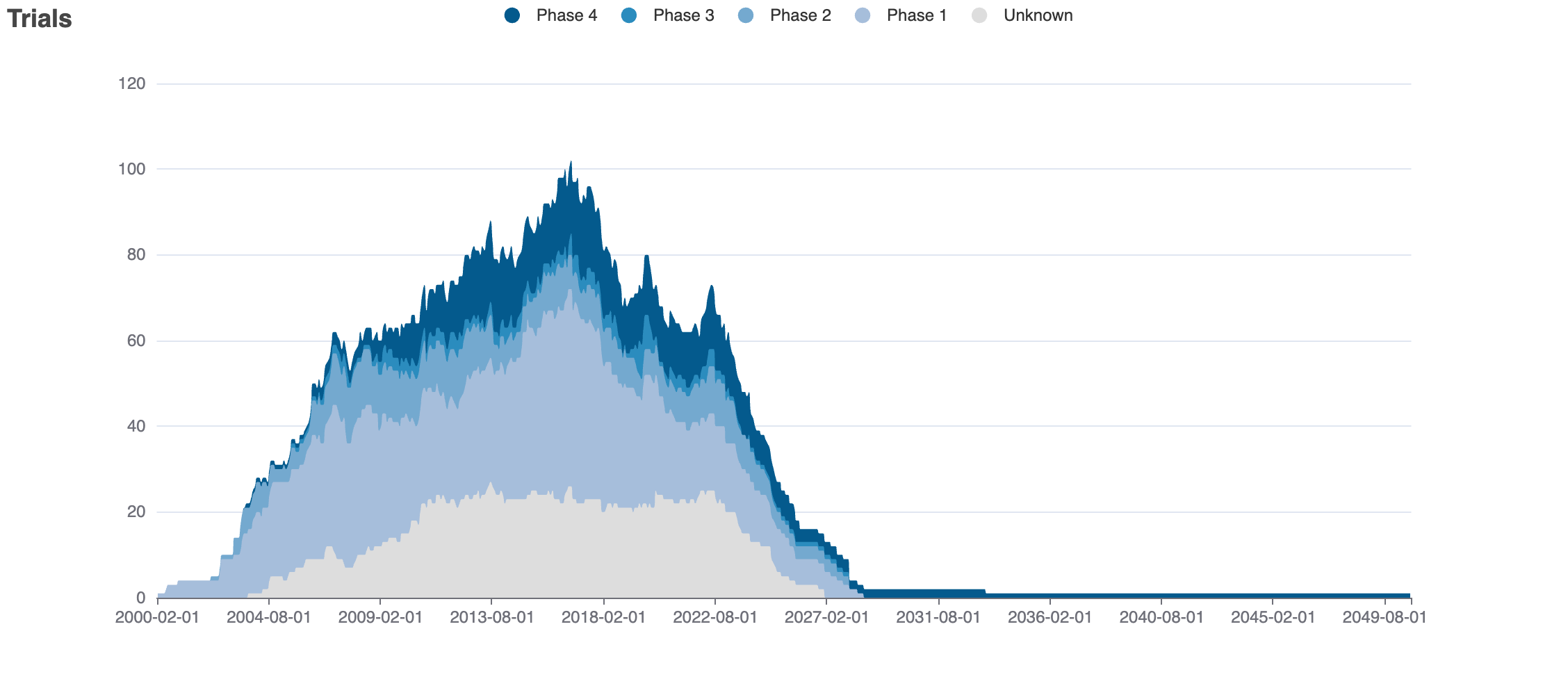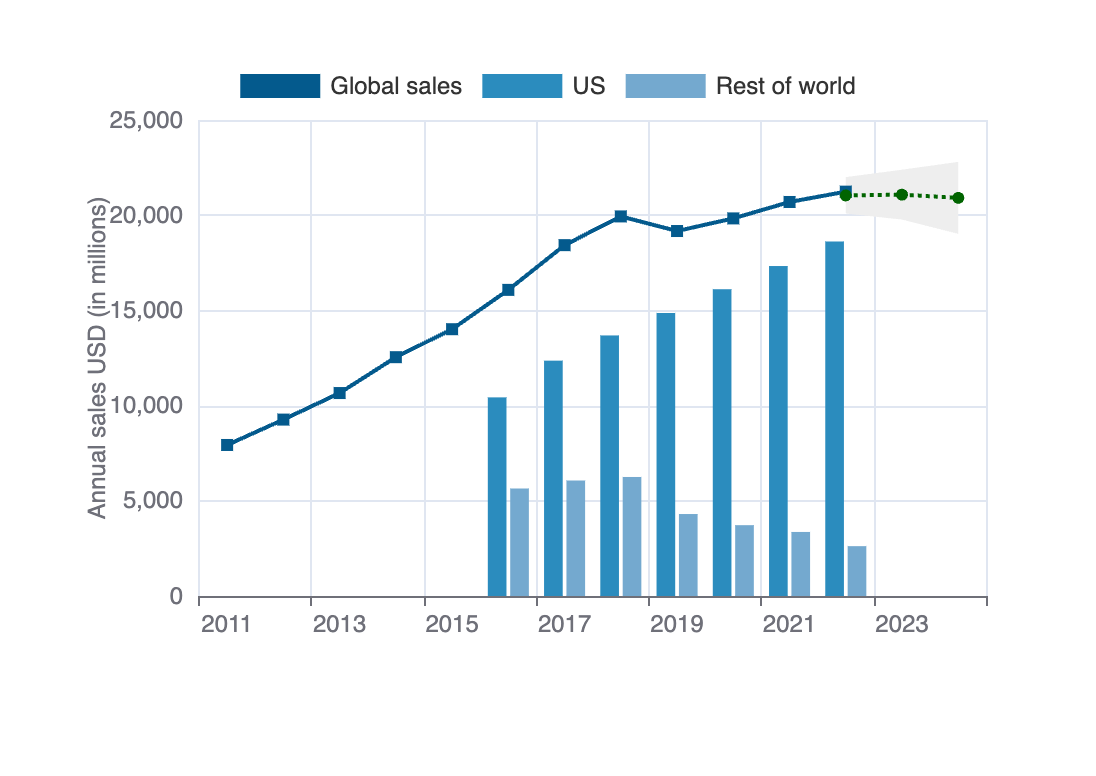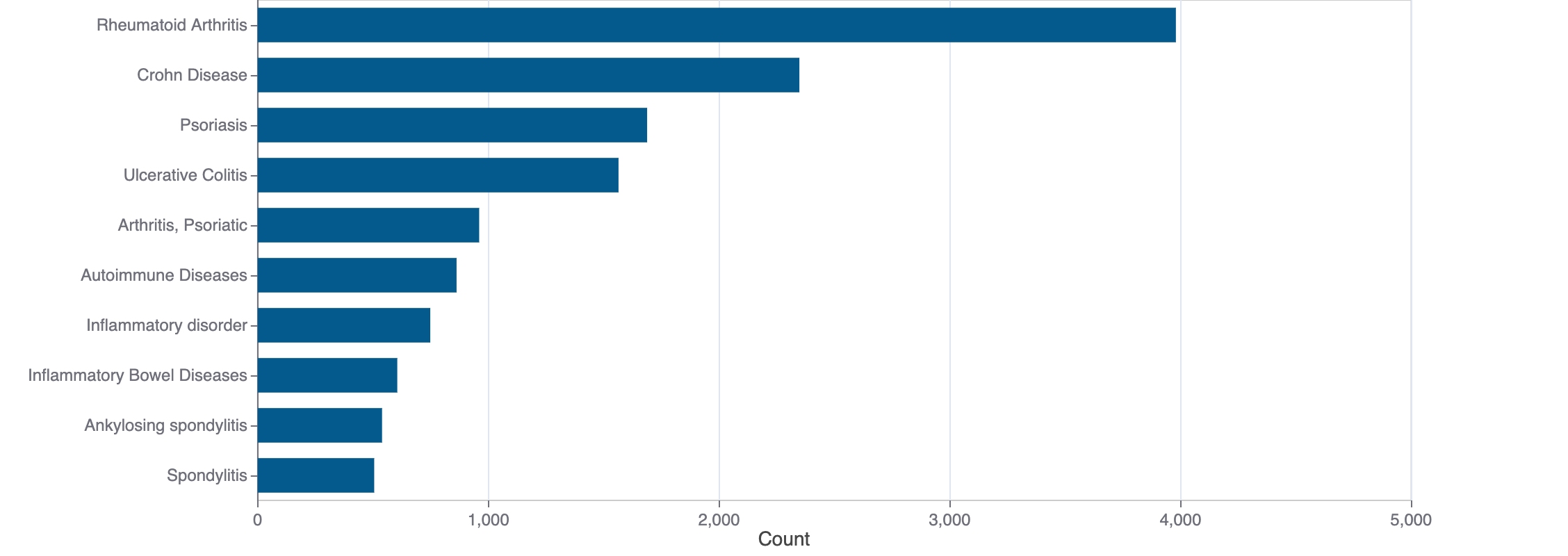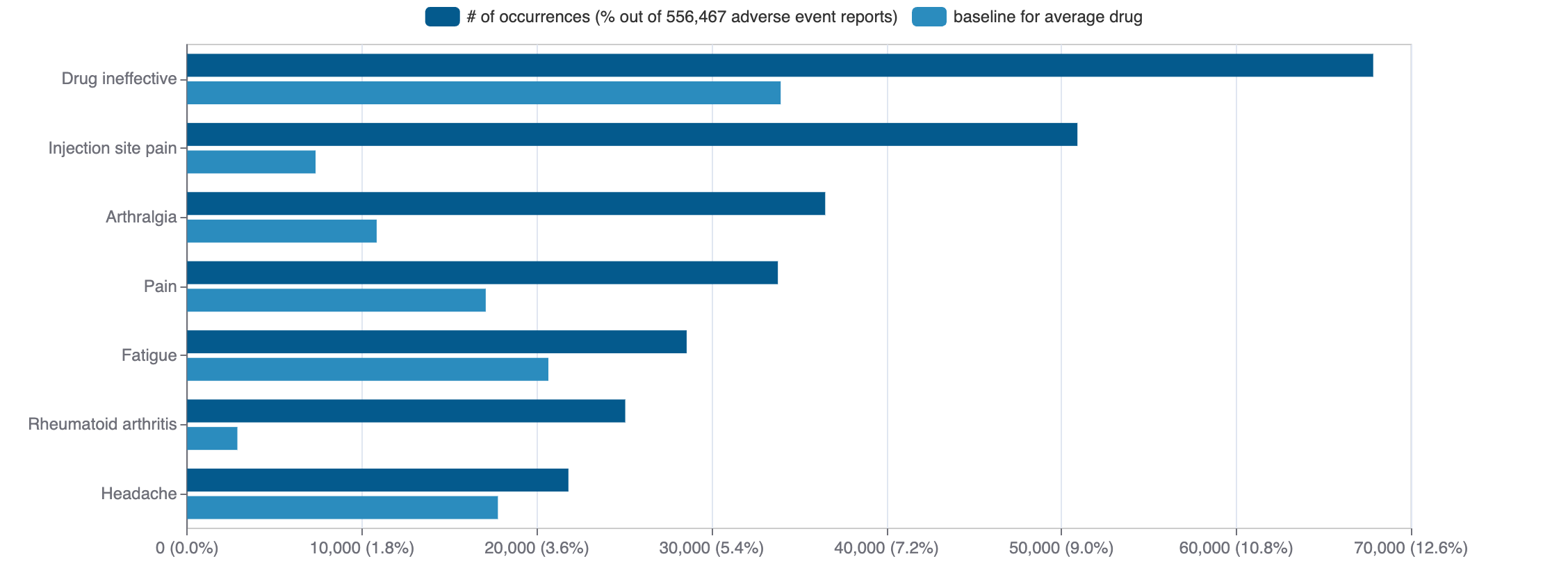Prolia(denosumab)
Prolia, Xgeva (denosumab) is an antibody pharmaceutical. Denosumab was first approved as Prolia on 2010-05-26. It is used to treat osteoporotic fractures and postmenopausal osteoporosis in the USA. It has been approved in Europe to treat bone fractures, bone resorption, neoplasm metastasis, and postmenopausal osteoporosis. The pharmaceutical is active against tumor necrosis factor ligand superfamily member 11.
Download report
Favorite
Top 200 Pharmaceuticals by Retail Sales
Commercial
Trade Name
FDA
EMA
Prolia, Xgeva
Drug Products
FDA
EMA
Reference product - 351(a)
Reference product - 351(a)
Interchangeable product - 351(k)
Interchangeable product - 351(k)
Biosimilar product - 351(k)
Biosimilar product - 351(k)
Indications
FDA
EMA
Indication | Ontology | MeSH | ICD-10 |
|---|---|---|---|
| osteoporotic fractures | — | D058866 | — |
| postmenopausal osteoporosis | EFO_0003854 | D015663 | — |
Agency Specific
FDA
EMA
Expiration | Code | ||
|---|---|---|---|
denosumab, Xgeva, Amgen Inc. | |||
| 2121-12-05 | Orphan excl. | ||
Patent Expiration
No data
HCPCS
Code | Description |
|---|---|
| J0897 | Injection, denosumab, 1 mg |
Clinical
Clinical Trials
249 clinical trials
View more details

Mock data
Subscribe for the real data
Subscribe for the real data
Indications Phases 4
Indication | MeSH | Ontology | ICD-10 | Ph 1 | Ph 2 | Ph 3 | Ph 4 | Other | Total |
|---|---|---|---|---|---|---|---|---|---|
| Osteoporosis | D010024 | EFO_0003882 | M81.0 | 5 | 12 | 20 | 14 | 5 | 54 |
| Postmenopausal osteoporosis | D015663 | EFO_0003854 | 4 | 4 | 18 | 11 | 5 | 42 | |
| Breast neoplasms | D001943 | EFO_0003869 | C50 | 5 | 11 | 8 | 1 | — | 25 |
| Metabolic bone diseases | D001851 | HP_0000938 | 1 | 4 | 9 | 1 | 2 | 17 | |
| Neoplasms | D009369 | C80 | 2 | 4 | 5 | 1 | 1 | 12 | |
| Giant cell tumor of bone | D018212 | — | 3 | 1 | 2 | 2 | 8 | ||
| Prostatic neoplasms | D011471 | C61 | — | 1 | 4 | 1 | — | 6 | |
| Rheumatoid arthritis | D001172 | EFO_0000685 | M06.9 | 1 | 2 | — | 1 | 1 | 5 |
| Spinal cord injuries | D013119 | EFO_1001919 | — | — | — | 4 | — | 4 | |
| Primary hyperparathyroidism | D049950 | EFO_0008519 | E21.0 | — | — | 1 | 2 | — | 3 |
Show 14 more
Indications Phases 3
Indication | MeSH | Ontology | ICD-10 | Ph 1 | Ph 2 | Ph 3 | Ph 4 | Other | Total |
|---|---|---|---|---|---|---|---|---|---|
| Multiple myeloma | D009101 | C90.0 | — | 5 | 2 | — | — | 7 | |
| Castration-resistant prostatic neoplasms | D064129 | — | 2 | 4 | — | — | 6 | ||
| Non-small-cell lung carcinoma | D002289 | — | 3 | 1 | — | 1 | 5 | ||
| Osteogenesis imperfecta | D010013 | Q78.0 | — | 1 | 2 | — | — | 3 | |
| Parathyroid neoplasms | D010282 | — | 1 | 1 | — | — | 2 | ||
| Renal cell carcinoma | D002292 | — | 1 | 1 | — | — | 2 | ||
| Anorexia nervosa | D000856 | EFO_0004215 | F50.0 | — | — | 2 | — | — | 2 |
| Beta-thalassemia | D017086 | Orphanet_848 | D56.1 | — | 1 | 1 | — | — | 2 |
| Bone fractures | D050723 | EFO_0003931 | T14.8 | — | — | 1 | — | 1 | 2 |
| Systemic mastocytosis | D034721 | C96.21 | — | — | 1 | — | — | 1 |
Show 7 more
Indications Phases 2
Indication | MeSH | Ontology | ICD-10 | Ph 1 | Ph 2 | Ph 3 | Ph 4 | Other | Total |
|---|---|---|---|---|---|---|---|---|---|
| Kidney neoplasms | D007680 | EFO_0003865 | C64 | — | 3 | — | — | — | 3 |
| Thyroid neoplasms | D013964 | EFO_0003841 | — | 2 | — | — | — | 2 | |
| Melanoma | D008545 | 1 | 2 | — | — | — | 2 | ||
| Aneurysmal bone cysts | D017824 | EFO_1001760 | M85.5 | 1 | 2 | — | — | — | 2 |
| Male infertility | D007248 | EFO_0004248 | N46 | — | 2 | — | — | — | 2 |
| Pancreatic neoplasms | D010190 | EFO_0003860 | C25 | 1 | 1 | — | — | — | 1 |
| Critical illness | D016638 | — | 1 | — | — | — | 1 | ||
| Carcinoma | D002277 | C80.0 | — | 1 | — | — | — | 1 | |
| Nasopharyngeal neoplasms | D009303 | — | 1 | — | — | — | 1 | ||
| Smoldering multiple myeloma | D000075122 | — | 1 | — | — | — | 1 |
Show 35 more
Indications Phases 1
Indication | MeSH | Ontology | ICD-10 | Ph 1 | Ph 2 | Ph 3 | Ph 4 | Other | Total |
|---|---|---|---|---|---|---|---|---|---|
| Healthy volunteers/patients | — | 9 | — | — | — | 1 | 10 | ||
| Male breast neoplasms | D018567 | 1 | — | — | — | — | 1 | ||
| Breast density | D000071060 | 1 | — | — | — | — | 1 | ||
| Ovarian neoplasms | D010051 | EFO_0003893 | C56 | 1 | — | — | — | — | 1 |
| Aging | D000375 | GO_0007568 | R41.81 | 1 | — | — | — | — | 1 |
| Replacement arthroplasty hip | D019644 | 1 | — | — | — | — | 1 | ||
| Immunosuppression therapy | D007165 | 1 | — | — | — | — | 1 | ||
| Delayed hypersensitivity | D006968 | 1 | — | — | — | — | 1 | ||
| Ultraviolet rays | D014466 | 1 | — | — | — | — | 1 | ||
| Renal insufficiency | D051437 | HP_0000083 | N19 | 1 | — | — | — | — | 1 |
Indications Without Phase
Indication | MeSH | Ontology | ICD-10 | Ph 1 | Ph 2 | Ph 3 | Ph 4 | Other | Total |
|---|---|---|---|---|---|---|---|---|---|
| Chronic kidney failure | D007676 | EFO_0003884 | N18.6 | — | — | — | — | 1 | 1 |
Epidemiology
Epidemiological information for investigational and approved indications
View more details
Drug
General
| Drug common name | DENOSUMAB |
| INN | denosumab |
| Description | Immunoglobulin G2, anti-(human tumor necrosis factor ligand superfamily member 11 (human osteoclast differentiation factor))(human monoclonal AMG162 heavy chain), disulfide with human monoclonal AMG162 light chain, dimer |
| Classification | Antibody |
| Drug class | monoclonal antibodies |
| Image (chem structure or protein) | |
| Structure (InChI/SMILES or Protein Sequence) | — |
Identifiers
| PDB | — |
| CAS-ID | 615258-40-7 |
| RxCUI | 993449 |
| ChEMBL ID | CHEMBL1237023 |
| ChEBI ID | — |
| PubChem CID | — |
| DrugBank | DB06643 |
| UNII ID | 4EQZ6YO2HI (ChemIDplus, GSRS) |
Target
Agency Approved
TNFSF11
TNFSF11
Organism
Homo sapiens
Gene name
TNFSF11
Gene synonyms
OPGL, RANKL, TRANCE
NCBI Gene ID
Protein name
tumor necrosis factor ligand superfamily member 11
Protein synonyms
CD254, ODF, OPGL, Osteoclast differentiation factor, Osteoprotegerin ligand, RANKL, receptor activator of nuclear factor kappa B ligand, Receptor activator of nuclear factor kappa-B ligand, TNF-related activation-induced cytokine, TRANCE, tumor necrosis factor (ligand) superfamily, member 11, tumor necrosis factor ligand 6B, tumor necrosis factor superfamily member 11
Uniprot ID
Mouse ortholog
Tnfsf11 (21943)
tumor necrosis factor ligand superfamily member 11 (Q9R1Y0)
Alternate
No data
Variants
Clinical Variant
No data
Financial
Xgeva - Amgen
$
€
£
₣

Mock data
Subscribe for the real data
Subscribe for the real data

Mock data
Subscribe for the real data
Subscribe for the real data
Prolia - Amgen
$
€
£
₣

Mock data
Subscribe for the real data
Subscribe for the real data

Mock data
Subscribe for the real data
Subscribe for the real data
Tabular view
Trends
PubMed Central
Top Terms for Disease or Syndrome:

Mock data
Subscribe for the real data
Subscribe for the real data
Additional graphs summarizing 11,156 documents
View more details
Safety
Black-box Warning
No Black-box warning
Adverse Events
Top Adverse Reactions

Mock data
Subscribe for the real data
Subscribe for the real data
211 adverse events reported
View more details
Premium feature
Learn more about premium features at pharmakb.com
Learn more
